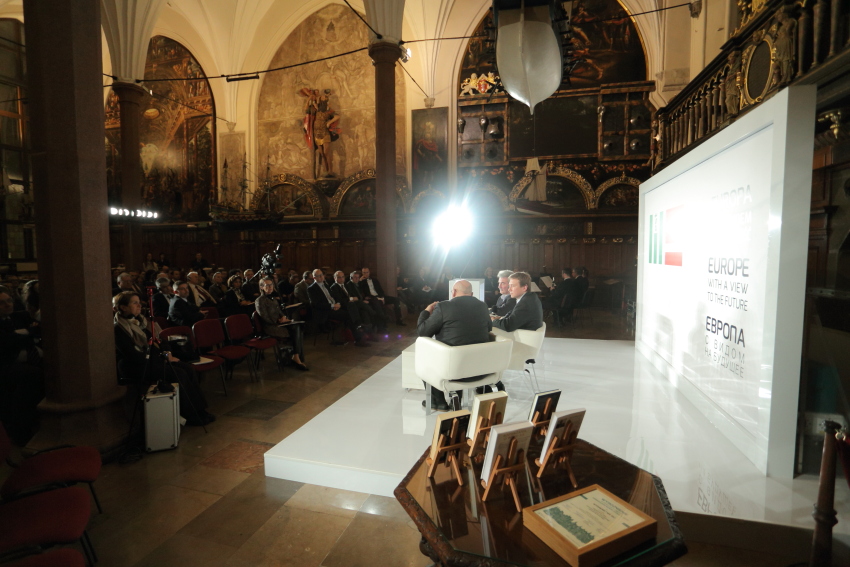Russia – Never-Ending Authoritarianism?

The European Solidarity Centre organized a conference in Gdansk, Poland (Nov 7, 2013) entitled “Europe with a view to the Future” including a panel discussion which focused on the significance of Mikhail Khodorkovsky in Russia today.
The panel was hosted by editor in chief of the New Eastern Europe quarterly, Mr Andrzej Brzeziecki and his guests included long time Russian correspondent of the biggest daily newspaper, Gazeta Wyborcza, along with Wacław Radziwinowicz and co-author of the book “Russia – the Never-Ending Authoritarianism?”, Aleksandr Pumpyansky.
During the discussion, the panelists highlighted the significance of Khodorkovsky’s arrest in 2003 to the direction that Putin’s regime subsequently took Russia. They also remarked on the change Khodorkovsky has undergone during his prolonged imprisonment – from successful businessman to Russia’s most famous political prisoner.
Mr. Pumpyansky noted that Mikhail Khodorkovsky had become a symbol of Russia that is different from Putin’s Russia. He pointed out that his experiences, the changes to his life and his widely recognized political imprisonment, made Khodorkovsky an absolutely unique figure in today’s Russia. Mr. Pumpyansky explained that Khodorkovsky’s arrest was a turning point for Putin’s regime, a moment when it was decided that instead of democratic reform, authoritarianism and the self-seeking siloviki” circle around the President would be strengthened. He added that bureaucrats, prosecutors and judges behaved in a similar fashion, caring for nothing other than their personal position and not for the interests of the rule of law, which they are supposed to protect and build.
When asked about the differences between Khodorkovsky and Alexey Navalny, Mr Radziwinowicz argued that while Navalny is currently a popular opposition figure, Khodorkovsky stood for something different. He explained that Khodorkovsky understood that Russia did not need a new “tsar”, but truly democratic reforms towards democracy. He went on to explain that regions like Kaliningrad, which enjoy visa free movement with the Gdansk region, proves that contrary to popular belief Russian citizens can be drawn to democratic values. In addition he focused on the fact that under Khodorkovsky’s direction Yukos heavily invested in technology and strategic technological development, attributes which both the Russian oil industry and Russia in general desperately lacked under Putin and his government. Mr. Radziwinowicz was also critical of the Olympic Games in Sochi, which in his opinion, demonstrated in many ways the inefficiency of Putin’s authoritarianism.
The European Solidarity Centre is a multifunctional institution combining scientific, cultural and educational activity with a modern museum and archive, documenting freedom of movement in the modern history of Poland and Europe. The Letter of Intent to create ESC was signed by heads of state and government, who gathered in Gdansk in 2005, on the 25th anniversary of the establishment of Solidarność. The Centre was established in Gdańsk on 8 November 2007, by the Minister of Culture, the Marshall of the Pomeranian Voievodship, the President of Gdańsk, the President of the European Solidarity Centre Foundation and the Chairman of the NSZZ Solidarność Trade Union. The main purpose of the European Solidarity Centre is to preserve the heritage and retain a fond memory of Solidarność in order to hand it down to future generations, while stressing its relevance and universal value.
The idea of founding the College of Eastern Europe was created in spring 2000 during the stay of Jan Nowak-Jezioranski in Wroclaw and his trip to the International Youth Meeting Center in Krzyżowa. Some time later in Tygodnik Powszechny, creator of the foundation wrote: “I was leaving Krzyzowa thinking that it is a strategic point on the way to a happy and safe future for Poland, and also convinced that there should be some more places like Krzyżowa as places for meetings between Poles and Ukrainians, Poles and Russians and Belarusians and Lithuanians.” . The foundation was formed on 9 February to fulfill this mission.



